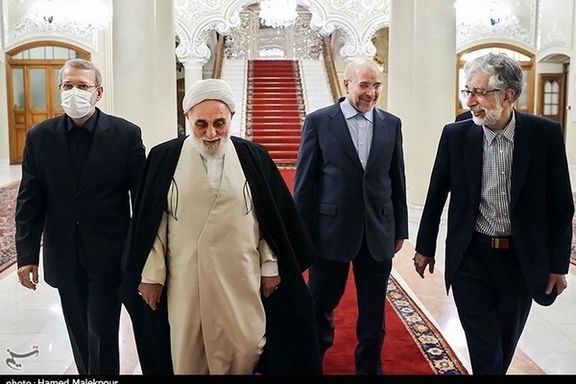Iran’s Traditional Conservatives Face Uphill Battle Against Hardliners

An analysis published in Tehran says the conservative are too weak to win the next parliamentary election or even to ensure their survival in the political landscape.

An analysis published in Tehran says the conservative are too weak to win the next parliamentary election or even to ensure their survival in the political landscape.
Reformist daily Shargh Online wrote in a political analysis that conservative political figures such as, former parliamentary Speaker and traditional conservative Gholamreza Ali Haddad-Adel and his successor, neo-conservative Mohammad Bagher Ghalibaf are not likely to be able to win the next parliamentary elections in March even if they form a coalition together.
The report said that they might need the support of moderate conservative Ali Larijani, another former Speaker to make that form a successful alliance. Only then they might be able to defeat the powerful hardline conservative front led by former IRGC General Sadeq Mahsouli one of the leaders of Paydari Party, which other conservatives regard as a “radical” group.
The analysis loosely characterised Ali Larijani as “the new right,” Ghalibaf and Haddad Adel as “moderate right” and Paydari as “radical.” This characterisation is interesting and shows how the far right has radically distanced itself from the main body of the conservative camp, so that all others look relatively moderate when they are compared with Paydari.
Such a tripartite alliance, if ever formed, may be able to put an end to the country’s political impasse and save the Islamic Republic from an even bigger political crisis, the analysis concluded.
However, the report ignored the fact that without opening up some space for the regime’s ‘reformists’ the political impasse will not end.

The Coalition Council of the Revolutionary Forces (Persian acronym: SHANA) which represents traditional conservatives, held a meeting on Thursday but like many other such meetings by political groups and parties they did not publish any photos of the gathering for the likely reason of a low turnout.
The monopoly of power by hardliners in both the executive and the parliament has dissuaded more moderate conservatives from a serious political agenda as they know that forming coalitions and will not work unless they have the overt support of Supreme Leader Ali Khamenei and his aides.
According to Shargh, politicians such as Ghalibaf and Haddad-Adel fear that without Larijani joining them, the radicals might kick them out of political competitions in the same way they got rid of Larijani in the 2021 presidential elections. However, the article did elaborate on why Larijani can help the other two politicians, who apart from everything else, happen to be Khamenei’s relatives.
All other conservative alliances during previous elections either fell apart before the voting day or they were faced down by the ultra-conservative Paydari in the last minute.
On the other hand, Ali Larijani is not known for having a sizeable following. Members of the Iranian Parliament who worked closely with him have not been observed to defend him after his disqualification by the Guardian Council in 2021. Since then, on the contrary, the Paydari has been gaining more political power in the parliament where it holds the majority, and in President Ebrahim Raisi’s cabinet.
The only factor that can help more moderate conservatives, including Larijani and Haddad-Adel, is the poor record of ultra conservatives both in the cabinet and in parliament, where Ghalibaf as speaker shares the blame.
Both the current economic crisis and repression, with no end in sight, have badly discredited the hardliners, who for the past two years have enjoyed a total monopoly of power.
On the other hand, some political observers in Iran, including the author of Shargh’s analysis, Davoud Heshmati believe the “purification” process that kicked Larijani out of the power circle might also expel Ghalibaf in the next election.